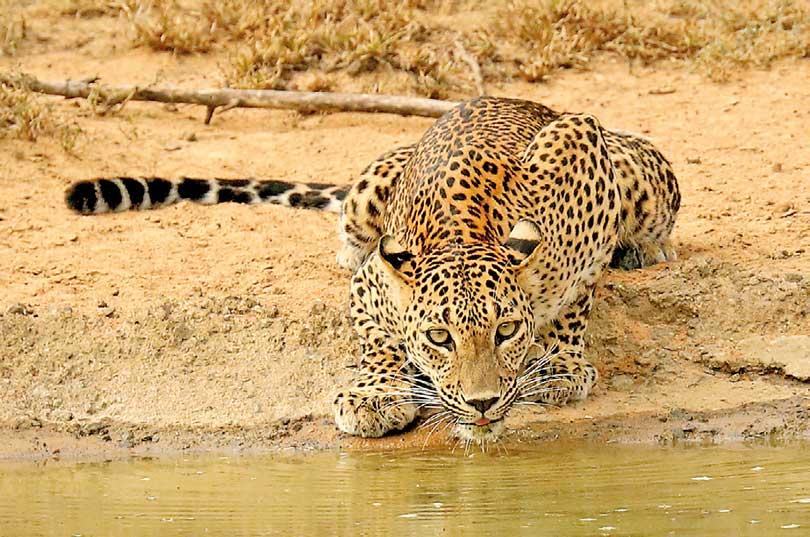Reply To:
Name - Reply Comment
Last Updated : 2024-04-19 19:07:00

The start of a new trade?
Once again conservationists have been horrified at the killing of an adult male leopard on the borders of the Uda Walawe National Park. The body had been dismembered – paws cut off and teeth removed – and the carcass carelessly thrown into a waterway that flows from the park, near Mau Ara, towards Hambanthota. Unlike Yala and Wilpattu, there is a much smaller population of leopard at Uda Walawe and the loss of even one is a tragedy. For it to happen in this grisly manner raises many questions that need answers.
The market for leopard bones and teeth
There was a time when leopards were shot for their beautiful skins. Now, with the ban on owning these pelts, the majority of leopard deaths have been due to conflict with humans – mainly due to encroachment into their natural habitat. There have, however, been rumours that with the better protection now given to tigers in India, a demand has been created for leopard bones, claws and teeth which are then sold as tiger products as it is very difficult to tell them apart without DNA analysis. There continues to be a ready, large-scale market for these beautiful creatures that endangers their future existence in the wild.
The incident at Uda Walawe seems to confirm that this is the market to which the killers were pandering, to a buyer either within this country or outside of it. Just the one leopard death seems to indicate the former, though if appropriate measures are not taken, the lucrativeness of the market could result in a larger scale slaughter of this protected species.
What should be done to prevent it?
Once the main focus of the Department of Wildlife (DWC) was that of conservation of the protected areas. To effect this, the field staff of the National Parks would undertake daily patrols of these areas and their boundaries, with Beat Stations placed at strategic points, the latter having a permanent cadre of officers. These have, alas, mostly been done away with, with just occasional patrols as knee-jerk reactions to incidents such as this, and several of the Beat Stations fallen into wrack and ruin. At Uda Walawe, this is the case of the two stations at Parana Pinnagasmankada and Kaudili Ara, both important access points for intruders. Ironically, there is still one at Mau Ara to protect the entrance there.
The DWC, however, are not solely to blame for this. In the last two decades the bulk of their human resources has been used for visitor services. With an explosion in the number of those visiting the Parks, both local and international, the major part of their time is taken to cater to these demands. There is little time for conservation.
In addition, there are about 400 approved cadre vacancies for field staff which have been pending for many years and despite a series of political promises, have never been filled, the necessary budgets not being released by the Ministry of Finance. If these were filled, then there would be enough personnel to undertake both conservation and visitor requirements. There is also an irony that despite the vast amounts of income that the National Parks earn for this country that the funds to employ staff to protect them are not made available. The Government must realise that the mandate of DWC is wildlife conservation and not tourism, so revenue from National Parks should not be at the expense of wildlife conservation.
Once again conservationists have been horrified at the killing of an adult male leopard on the borders of the Uda Walawe National Park. The body had been dismembered – paws cut off and teeth removed – and the carcass carelessly thrown into a waterway that flows from the park
A plea for action
The Federation of Environmental Organisations (FEO) calls on the Government to take immediate steps to implement the suggestions above to try and stop the proliferation of these killings. The human – elephant conflict has already brought one endangered species to the brink of extinction. Are we to add the Sri Lanka Leopard, Pantheraparduskotiya, another unique sub-species of this country to that status?
Federation of Environmental Organisations (www.feosrilanka.org)
FEO is a non‐political, non-partisan organisation that provides a platform for connecting interest groups with a patriotic interest in safeguarding Sri Lanka’s natural heritage through conservation and advocacy.
Sent by - Feferation of Environmental Organisations Sri Lanka

Add comment
Comments will be edited (grammar, spelling and slang) and authorized at the discretion of Daily Mirror online. The website also has the right not to publish selected comments.
Reply To:
Name - Reply Comment
On March 26, a couple arriving from Thailand was arrested with 88 live animal
According to villagers from Naula-Moragolla out of 105 families 80 can afford
Is the situation in Sri Lanka so grim that locals harbour hope that they coul
A recent post on social media revealed that three purple-faced langurs near t